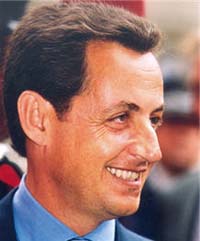Sarkozy marks milestone in lifelong drive to become president of France
What would be more unthinkable: a French president who doesn't drink wine, one who proudly considers himself pro-American, or one who thinks France has been too arrogant in world affairs?

In Nicolas Sarkozy, all of the above would apply.
His anointment on Sunday as presidential candidate for the mainstream French right will mark a milestone in an almost lifelong quest by the son of a Hungarian immigrant to become France's head of state.
It will also herald a changing of the guard from the era of President Jacques Chirac and sound the starting whistle for a close election race expected to provide new direction for a nation down on itself, deeply worried about its future in Europe and the world, the economic challenge from China, and how to reach out to its unemployment-stricken blacks, Arabs and Muslims.
Sarkozy's main challenger will be Socialist Segolene Royal. Both their platforms center on promises of change.
Sarkozy's ruling UMP party is pulling out all the stops for the candidate's nomination: a big-budget, American-style show with giant video screens and thousands of supporters is expected Sunday for the convention. Sarkozy was the party's only candidate for the nomination, after other presidential hopefuls fell by the wayside.
Sarkozy hopes the show will offer a jolt of momentum ahead of the two-round election in April and May. Polls show him in a neck-and-neck race with Royal, who would be France's first woman president.
Sarkozy says he wants to snap France out of what he calls its outdated ways. To many, the French are overtaxed, overburdened by government fees that crimp innovation, too enamored with the French language he wants them to speak better English and ill-prepared for globalization.
In foreign policy, he wants a more humble France and closer U.S. ties. He has embraced the moniker "Sarko l'Americain," affixed by his critics. In a published interview in November, he said: "Everybody who has traveled a bit knows that arrogance is too often a French defect."
Nicolas Paul Stephane Sarkozy de Nagy-Bocsa got an early start in politics. A first springboard came as a long-haired 20-year-old leader of young Gaullists, when he took the podium at a 1975 political meeting in Nice after an introduction by then-Prime Minister Jacques Chirac.
"That you, Sarkozy? You have five minutes," Chirac snapped. Sarkozy went on for 20, the premier was smitten and a three-decade political relationship of both intimate ties and fierce rivalries was born.
Sarkozy's ascent was breathtaking: In 1983, he became mayor of Neuilly-sur-Seine west of Paris, one of France's richest towns, and became France's youngest mayor. Five years later, he was elected as a National Assembly lawmaker. In 1993, he was named budget minister and government spokesman.
His biggest misstep came in 1995, when he backed Prime Minister Edouard Balladur in the presidential race that year which was won by Chirac, who seethed at the betrayal. Sarkozy was locked out of power, reports AP.
In 2002, after his re-election, Chirac gave Sarkozy a reprieve, appointing him as interior minister to make good on his campaign promise to bring down crime. Sarkozy threw himself into the task, revamping the police and toughening laws.
A self-proclaimed supporter of the euro and the European Union, Sarkozy has also sought to shield French industries from outside competition. While finance minister from 2004-2005, Sarkozy championed free market principles and tax cuts, but defended French engineering company Alstom from a takeover by Germany's Siemens angering Berlin.
Subscribe to Pravda.Ru Telegram channel, Facebook, RSS!




